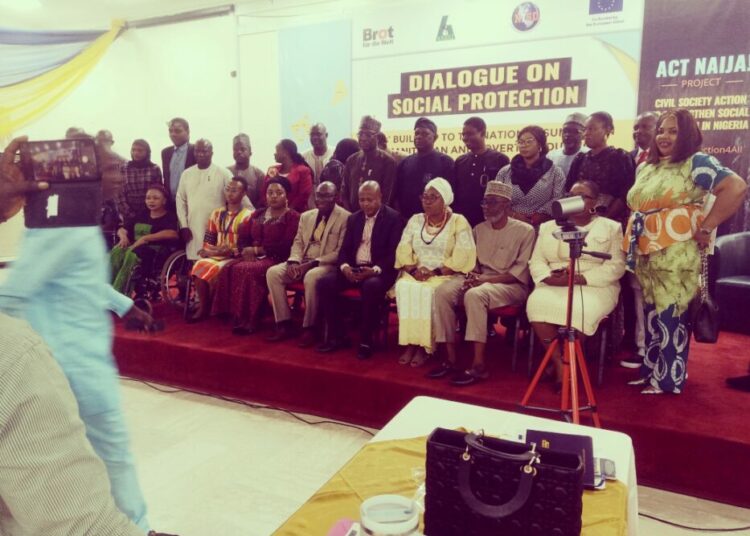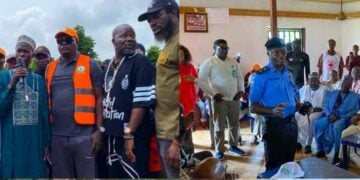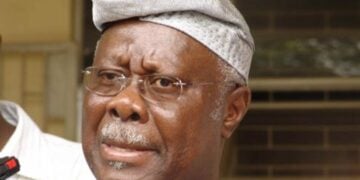The federal government and some civil society organisations have called for the implementation of a Special Protection Programme for vulnerable populations, including internally displaced persons (IDPs), to reduce poverty levels across rural areas.
They spoke at a dialogue on “Special Protection, CSOs’ Build-up to the National Summit on Humanitarian and Poverty Reduction in Nigeria,” in Abuja yesterday under the ACT NAIJA Project: Civil Society Action to Strengthen Social Protection in Nigeria.
The dialogue, organised by ACT NAIJA – a civil society initiative to strengthen social protection and support civil society in Nigeria, is being implemented by the Africa Network for Environment and Economic Justice (ANEEJ) and the New Initiative for Social Development (NISD).
The event brought together government leaders, civil society actors, development partners, and the private sector to accelerate efforts toward poverty alleviation in Nigeria.
The two-day National Dialogue aims to consolidate policy efforts, foster multi-stakeholder collaboration, and track implementation progress on social protection initiatives.
The forum also provides an opportunity for community voices to review national progress, share lessons, and identify pathways to build inclusive and resilient social protection systems in Nigeria. The Poverty Reduction initiative is a three-year project co-funded by the European Union under a consortium comprising Brot für die Welt (BfdW) and the Africa Network for Environment and Economic Justice (ANEEJ).
Speaking at the event, Dr David Ugolor, Executive Director of ANEEJ, emphasised the commitment to achieving zero tolerance for poverty, especially among the less privileged and unemployed youth.
Dr Ugolor stressed the need for strategies to improve access to basic necessities such as food, education, and employment, while reducing income disparities and regional inequalities. He noted that poverty alleviation is about reducing statistics and empowering individuals and communities to become self-reliant and economically independent.
He said, “The high level of objective poverty in the country is alarming and underscores the urgent need for governments at all levels to take action.”
He emphasised the importance of broad participation in education, healthcare, access to clean water and sanitation, and the creation of sustainable livelihood opportunities for young Nigerians.
He highlighted the need for initiatives that promote job creation, entrepreneurship, access to financial resources, especially for women and youth, and social safety nets such as welfare support, food assistance, and cash transfers to vulnerable populations, including widows, single mothers, and low-income earners.
Dr Ugolor also called for increased collaboration between the federal, state, and local governments and greater involvement of civil society. He stressed the importance of updating the national social register to reflect the current realities of vulnerable Nigerians.
“There are many factors pushing people below the poverty line,” he said. “This project provides an opportunity to engage with the government. Fortunately, the government is currently reviewing the National Social Protection Policy to promote inclusive development.”
He stated that the upcoming National Social Protection Summit, scheduled for October 2025, provides an opportunity to incorporate insights from civil society and citizens into government planning.
“We are glad that the ministry recognises the role civil society can play in advancing social protection in Nigeria,” he added.
On the issue of multidimensional poverty, Ugolor pointed out that several systemic issues, including resource allocation and poor inter-agency coordination, need to be addressed. However, he expressed optimism, stating that the government is taking steps in the right direction.
“I strongly believe that with effective stakeholder engagement, many of the current obstacles to poverty alleviation will be tackled,” he said.
He urged the government to develop a robust and accurate social register, noting, “Without a credible register, policies and interventions can be politicised and ineffective.”
“A strong social register allows stakeholders—government, private sector, civil society—to access accurate data on poor populations by location for targeted interventions,” he added.
Also speaking, minister of state for humanitarian affairs and poverty reduction, represented by Valentine Ezulu, director of social development, emphasised that special protection is not charity but a right. He called on the federal and state governments to ensure that the rights of vulnerable Nigerians are protected.
He acknowledged the recurring humanitarian crises across the country but assured that the government is implementing mechanisms to tackle multidimensional poverty.
“The national social protection policy is currently under review to align with the current administration’s Renewed Hope Agenda, which focuses on addressing the root causes of poverty,” he stated.
He said the revised policy would ensure that interventions are extended beyond the federal and state levels to include local governments, in line with recent Supreme Court rulings granting autonomy to local councils.
According to him, President Bola Ahmed Tinubu has made deliberate efforts to empower local governments, recognising that the root of poverty lies in rural communities, which fall under their jurisdiction.
“The president is committed to empowering local governments to implement their own poverty alleviation programs independently, without interference from federal or state authorities,” he concluded.





